Destroyer courts chaos at Warehouse on Broadway
An evening of partial revelations and hypnotic flourishes more transfixed on atmosphere than resonance.
Dan Bejar’s reputation as indie pop’s patron saint of indifference makes it even more disarming to watch him attempt to disappear in real time right in front of you. Touring behind Dan’s Boogie, another trip down self-glorification that he’s consistently been at since ‘98, Bejar fronted his namesake through an 85-minute set at Warehouse on Broadway on Sunday, October 19, that played like a live denial of the very idea of epiphanies. The tracks unwound, contorted, sped ahead and ran back; the group pulsed and swelled; Bejar stood at the helm, half-singing and half-cowering into his drink, possibly embarrassed that we’d be interested in staring directly at him.
A 30-minute rendition from Jennifer Castle opened the night as she arrived solo, guitar in hand, with a stage presence that almost felt like a whisper. The overcast and pastoral folk sound carried the kind of intimate loneliness that succeeds in small rooms and dies in the festival circuit; here, it felt like she was fluctuating her voice to match that circuit. Castle is an artist whose work relies on quiet and implication, with emotion in the negative space. But Warehouse on Broadway, an impressive new venue more accustomed to bar-night conversing and heavy bands, didn’t provide her much in return. At times when the audience held their own, her songs–particularly closer “Blowing Kisses,” which was featured on the latest season of The Bear–bloomed ostensibly like the slow sensation of a storm approaching. When those moments broke, they collapsed quite easily.
Still, Castle’s time worked well as a prologue: a hurried, sensual operation in stripping things down before Destroyer brought everything to a breaking point. If her quiet nature suggested a private encounter, Bejar and crew’s performance proposed the other end: an avant-garde peroration about how little everything really matters.
He arrived on stage with the air of someone arriving in the middle of another activity, launching immediately into the motorik flicker of “The Same Thing as Nothing at All.” In person, the track’s heartbeat felt not so much like a meditation and more like a confrontation: a dare to stay on their wavelength. The seven-piece band of guitars, bass, drums, keys, and trumpet locked into their quintessential groove, one that reminds you of Berlin-era Bowie reincarnated for bar cocktails and increased existential dread. Clutching his Sennheiser 441 mic like a companion, Bejar moved in circles, delivering lines as though contemplating secrets to himself that nobody there was ever meant to be included in.
As a frontman, he is the anti-Dan Campbell, the anti-Jordan Dreyer. Where Campbell and Dreyer spend their LPs and live sets clawing at their own misery, begging all to watch their own revelations, Bejar seems befuddled by the notion of that very thing. Even at his most empathic–like Kaputt’s “Poor In Love,” which swelled quite nicely in a surprise inclusion–he created the profoundness without ever acknowledging the burden. It was oddly thrilling and sometimes a bit maddening: you could either give yourself over to the seven-piece, or you could spend the entire evening trying to decode the exposure and miss the intended purpose.
The band understood the assignment well. Destroyer has always walked the line between groove and malaise, and at their most vivid, they expand repetition into hypnotic goodness. “Sun Meet Snow” and closer “Suicide Demo for Kara Walker” were major highlights, the former levitating into a massive sprawl of sweaty instrumentation, the latter making its case as one of their most locked-in experimental live renditions, if “experimental” can be defined as five straight minutes of JP Carter having stage time to himself while Bejar sat down to drink his libation. The trumpet, a major, but polarizing feature that has become a mainstay since Joseph Shabason’s sax exit in 2017, became the set’s eccentric force: sometimes confusing, sometimes skronking, always threatening to hijack the entire building.
But the group also flirted with its own worst desires. A good number of arrangements, specifically mid-set, sprawled past energizing into over-indulgence. There were times when the performance felt like it was chasing a space of transcendence through massive accumulation from a large mix of antidotes, another groove, another stray, another extended vamp, rather than trusting the open space and sharper attunement. When they are cooking, the effect is chemically dangerous. When they overdo it, you can feel your body realizing it.
The stage exit after “Walker” led to two encore songs (“June” and “Streethawk I”) that landed like a whimper more than a deeper creative venture after “Walker”’s intensive mastery. Bejar gave a quick nod, muttered a “thank you,” and the lads exited with the energy of a man walking into another reality.
The night offered something both intoxicating and flawed: a production that rewarded some, punished your expectations, and made little attempt to move past the contradictions inherent at its core. Castle aimed for transcendence through silence; Bejar sought it through discombobulation. Neither fully worked. But both, in unique, artsy ways, convinced you it was worth the money.
All photos by Maddy Shugart



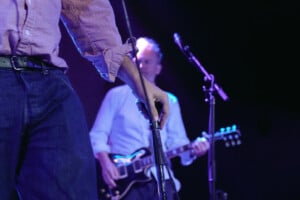


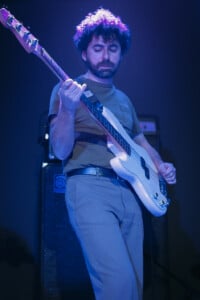





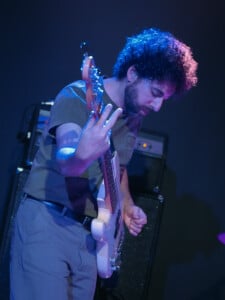






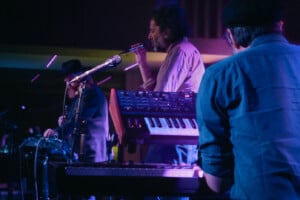
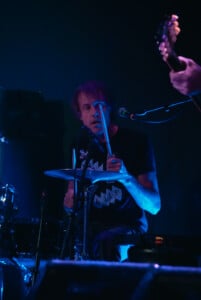

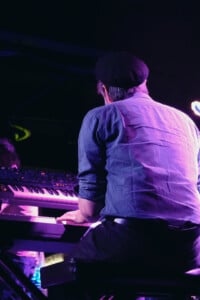

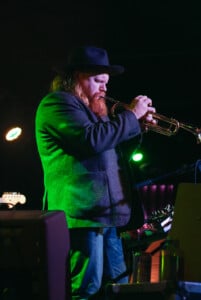



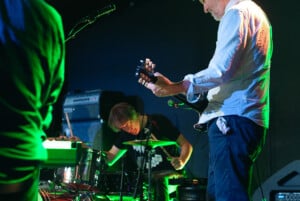


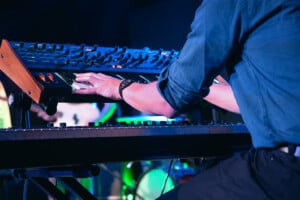
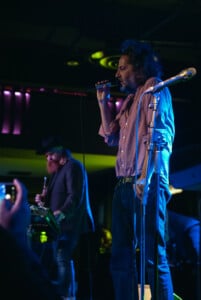
Destroyer setlist
The Same Thing as Nothing at All
It Just Doesn’t Happen
Times Square
Tinseltown Swimming in Blood
Bologna
Sun Meet Snow
Kaputt
Cue Synthesizer
Poor in Love
European Oils
Cataract Time
Hydroplaning Off the Edge of the World
Suicide Demo for Kara Walker
––
June
Streethawk I







